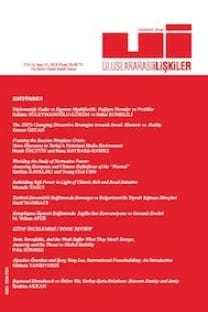1990’lardan Günümüze Türkiye-İsrail Stratejik İşbirliği
1990’lı yılların ortalarında Orta Doğu’daki en önemli ve en dikkat çekici ilişki olan Türk-İsrail ilişkileri, 2000’li yıllarda önemli iniş çıkışlar geçirmiştir. 1996’dan sonra “altın çağı”nı yaşayan ilişkilerin, 2003-2004’te dibe vurması ise hem bölgedeki dengelerin, hem de iki ülkedeki iç faktörlerin değişmesiyle açıklanabilir. Ortak tehdit algılamasının doğması ve güçlenmesiyle başlayan “altın çağ”ın, tehdit algılamasının azalması sonucunda gerileme devresini yaşadığı, Irak Savaşı ve AKP hükümetinin yeni dış politika vizyonunun da etkisiyle dibe vurduğu söylenebilir. Bu makale, ikili ilişkilerde yapısal ve dönemsel faktörlerin neler olduğunu ve bu faktörlerin iki ülke arasındaki ilişkiyi nasıl etkileyebileceğini incelemektedir.
Anahtar Kelimeler:
Türk-İsrail İlişikileri, Stratejik İşbirliği, Türk Dış Politikası, Irak Savaşı, Askeri İlişkiler
Turkish-Israeli Strategic Cooperation From 1990's until Today
Turkish-Israeli relations, which are important in the Middle East, were excellent in the mid1990s but suffered from ups and downs between 2000 and 2005. Turkish-Israeli relations, which celebrated their "golden age" after 1996, reached their lowest point in 2003-2004. This can be explained by changes in the balances between countries in the Middle East and by internal factors in the two countries. It can be argued that the "golden age," which began with the birth and strengthening of a shared threat perception, deteriorated in the absence of the threat perception. This article examines the structural and conjunctional factors in Turkish-Isreali relations and attempts to predict how those factors may affect Turkish-Israeli relations in the near future.
Keywords:
Turkish-Israeli Relations, Strategic Cooperation, Turkish Foreign Policy, War in Iraq, Military Relations,
- ISSN: 1304-7310
- Başlangıç: 2004
- Yayıncı: Uluslararası İlişkiler Konseyi Derneği İktisadi İşletmesi
Sayıdaki Diğer Makaleler
Türkiye’de Güvenlikleştirilmiş Bir Alan Olarak Dış Politikayı Yeniden Düşünmek: Kıbrıs Örneği
Küresel Politikanın Uzun Döngüsü ve Ulus-Devlet
Bağımsızlıktan Kadife Devrime Türkiye-Gürcistan İlişkileri
Avrupa’yı Bezdiren Hayalet: Avrupa Anayasası, Bütçe Krizi ve Neoliberal Bütünleşmenin Sınırları
Türkiye’nin İhracata Yönelik Ekonomi Politikalarında Avrasya’nın Stratejik Önemi
